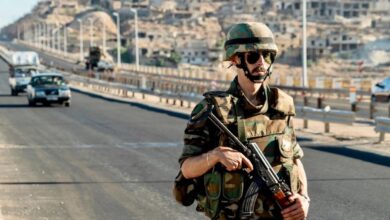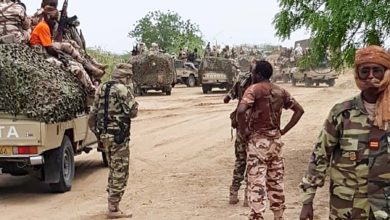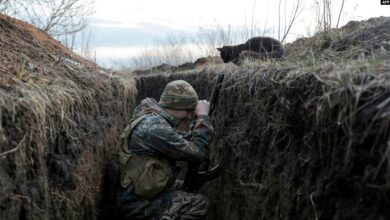AKURE, NIGERIA – Men in long gowns lined up in front of Nigerian soldiers, their heads bowed, baking in the harsh sun and sniffing the dusty air. Women draped in burkas sat on the bare ground, expressionless, some chewing groundnuts, shoulders touching.
The men and women, members of Islamic State West Africa Province (ISWAP) and Boko Haram, had surrendered to the Nigerian Army. The soldiers soon packed the insurgents’ belongings into lorries and vans and took them away.
On February 7, the army announced that 104 insurgents, including their families, surrendered to its troops in Borno State: 22 men, 27 women, and 55 children.
BREAKING: ISWAP fighters and their families numbering 104 comprising 22 males, 27 females and 55 children surrendered to troops of 25 Task Force Brigade Damboa, Borno State on Saturday 5 February 2022. pic.twitter.com/0Xq6t6dr8Q
— Nigerian Army (@HQNigerianArmy) February 7, 2022
A few days later, the governor of Borno State reported that more than 30,000 ISWAP and Boko Haram fighters had surrendered to date.
An e-mail by The Defense Post to the Nigerian Army inquiring about the significance of the surrender received no reply. However, the development illustrates the success of the army’s new, aggressive approach of ground troop deployment and aerial bombardment in Borno, including an increased troop presence in the south of the state to beat back the insurgents.
Nigerian Army’s New Borno Strategy
The Nigeria Army adopted this new strategy late last year, going on the offensive against entrenched enemy formations in the region.
Critics have long blamed the military’s inability to defeat Boko Haram and ISWAP on its “old-fashioned counter-insurgency strategy,” allowing them to strike before it takes action.
#BokoHaram Haram is regaining strength in #Nigeria as an old-fashioned counter-insurgency strategy is failing.The army’s setbacks in the north-east are hurting #Buhari’s campaign to win another presidential term in elections on February 23rd. pic.twitter.com/Q4V0QOkUqQ
— Adeline Van Houtte (@adeline_vh) February 21, 2019
In seeming reply, Chief of Army Staff Lieutenant General Faruk Yahaya spoke to officers in November about the military’s new strategy in tackling terrorist insurgents.
The plan of action combines sustained airstrikes with Tucano aircraft and heavy artillery bombardment, utilizing synergy between the army and the air force in its offensives while enhancing intelligence assets, elements absent in the past.
Explaining the new strategy, Niger Delta University political science lecturer Dr. Felix Oriakhi told The Defense Post that the military is now “taking the fight to the terrorists.”
Oriakhi called the new approach “instructive,” saying the Nigerian Army is “recording victories and forcing the insurgents and their families to surrender.”
Strategy Pays Off
Recent examples seem to confirm Oriakhi’s assertion. While the army has yet to provide data, its aggressive attack strategy appears to be reaping dividends.
Just this week, a patrol decimated Boko Haram and ISWAP elements in Damboa, southwestern Borno State, rescuing women and children in the process. “The surrender at Damboa demonstrates the success,” Oriakhi said.
On February 10, “scores of Boko Haram/ISWAP terrorists” died when troops of the 147 Task Force Battalion and Civilian Task Force attacked a village near Gubio in Borno State.

Two weeks earlier, troops of the 120 Task Force Battalion eliminated an undisclosed number of fighters in a “fierce encounter” in Goniri, five kilometers (three miles) across the border from Borno State.
Cautious Optimism?
While these developments are encouraging, there is still a long way to go, and Nigerians are all too aware of this.
“Well done to the military on the surrender,” Borno resident Ahmed Wachiko told The Defense Post in a phone interview, “but the surrender gives me concerns. I think the military should keep pressuring them.”
Nigerian Senator Shehu Sani agreed. He called the recent surrender of ISWAP fighters and their families “good news” but urged caution. “They must be closely watched and guided based on some previous bitter experiences,” he wrote on Twitter.
Zaki Ado, another Borno resident, also applauded the military for the capture. “But you can never really trust these terrorists,” the told The Defense Post. “They could be pretending.”
The surrenders provide a source of encouragement for the military and a small taste of victory in a long, bitter struggle.
However, it would be perilous for the army to become complacent. Insurgents have proven time and again that it would be a mistake to write them off in their seemingly neverending campaign.












